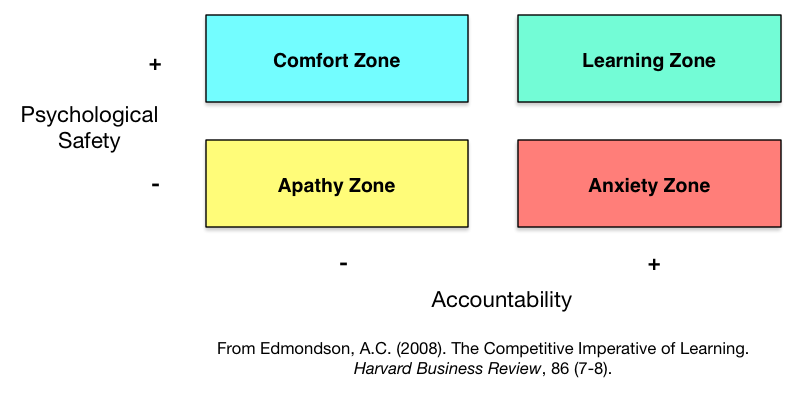In much of the discussion about tapping into the power of people via networks and communities, we hear about the learning culture we need. Items like psychological safety, valuing diversity, openness, and time for reflection are up front. And I’m as guilty of this as anyone! However, one other element that appears in the more rigorous discussions (including Edmondson’s Teaming and Sutton & Rao’s Scaling Up Excellence) is accountability. (Which isn’t to say that it doesn’t appear in other pictures, but it’s certainly not foreground.) And it’s time to address this.
So, the model for becoming agile is creating an environment where people learn, alone and together. But it’s informal learning. When you research, problem-solve, design, etc, you don’t know the answer when you start! Yet it’s not like anyone else has the answer, either. And we know that the output is better when we search more broadly through the possible solution space. (Which is what we’re doing, really.) This means we need diverse inputs to keep us from prematurely converging. Or searching too narrow a space. We also need also those different voices to contribute, or we won’t get there. And we have to be open to new ideas, or we could inadvertently cut off part of the solution space. We also need time and tools for reflection (hence reflecting out loud).
Typically, the process is iterative (real innovations percolate/ferment/incubate; they aren’t ‘driven’): going away, doing tasks, and returning. Here, we need to ensure people are contributing, doing the work. We don’t want to micromanage it, but we do want to assist people because we shouldn’t assume that they’re effective self and social learners. In short, we can’t squelch the feeling of autonomy to accompany purpose (ala Dan Pink’s Drive), yet the job must get done!
 When there’s purpose, and community, accountability is natural. When we comprehend how what we’re doing contributes, when we have reciprocal trust with our colleagues that we’ll each do our part, and when there’s transparency about what’s happening, it’s a natural. A transactional model, when it’s a network and not a community, doesn’t feel safe, and doesn’t work as well. As Edmondson documents it, you want to be in the learning zone where you have both accountability and safety. And that’s not an easy balance.
When there’s purpose, and community, accountability is natural. When we comprehend how what we’re doing contributes, when we have reciprocal trust with our colleagues that we’ll each do our part, and when there’s transparency about what’s happening, it’s a natural. A transactional model, when it’s a network and not a community, doesn’t feel safe, and doesn’t work as well. As Edmondson documents it, you want to be in the learning zone where you have both accountability and safety. And that’s not an easy balance.
So one of the steps to get there is to ensure accountability is part of the picture. And it’s not just calling someone on the carpet. Done right, it’s a tracking and regular support to succeed, so accountability is an ongoing relationship that suggests we want you to succeed, and we’ll help you do that. Accountability shouldn’t be a surprise! (Transparency helps.)
When we talk about the high-minded principles of making it safe and helping people feel welcome, some can view this as all touchy-feely and worry that it won’t get things done. Which isn’t true, but I think it helps if we keep accountability in the picture to assuage those concerns. Ultimately, we want outcomes, but new and improved ones, not just the same old things. The status quo isn’t really acceptable today. In this increasingly dynamic environment, the ability to adapt is key. And that’s the Learning Zone. Are you ready to go there?
La resistencia a los cambios se explica por la carencia de la toma de responsabilidades en el aprendizaje, sin embargo el entusiasmo de algunos ante las mismas innovaciones es algo que existe y que atenta a reforzar la calidad de la educación, misma que hace que esta resistencia se difumine con el tiempo; aún asà mientras ésta se encuentra presente, regularmente necesita ser procesada con medidas existentes y de una forma sistemática que conlleva al conocimiento.
Últimamente venimos explicando la necesidad de cambiar dos palabrazs que han “abrazado el mundo†las recientes centurias: Éstas son…derecho y obligación y nos estamos postulando por implantar otras dos más frescas y actuales y con una relación directa con la actualidad…responsabilidad y compromiso…
¿Hasta qué punto estamos dispuestos y queremos comprometernos como sociedad, para los cambios masivos en las capacidades humanas que las tecnologÃas digitales son propensos a permitir en los próximos años?
¿Hasta qué punto son nuestras visiones de futuro para la educación sobre la base de suposiciones acerca de la humanidad, la sociedad y la tecnologÃa actuales ya son válidos?
¿Hasta qué punto podemos , ayudar a dar forma a la evolución de la tecnologÃa con el fin de mejorar el desarrollo humano? ….
Clark –
Great addition to an important topic. I’ve been focusing lately on accountability as THE transformational element in education, but with an important shift in who is accountable to whom. I think you allude to a similar accountability framework in your post. Here’s a recent entry on the subject on my blog.
https://edunautics.com/2016/08/18/assisted-accountability-the-true-flipped-classroom/
I’m sure I picked part of this up from you in the MIST program at CSUMB :-)
Love the model! I do believe we need to address learners’ epistemological stance: what do they believe their role in learning is? If nothing else, we need to scaffold the transition to them taking responsibility. I talk a bit about that here: https://blog.learnlets.com/2012/04/reimagined-learning-activities-elaborated/
Thanks Clark!